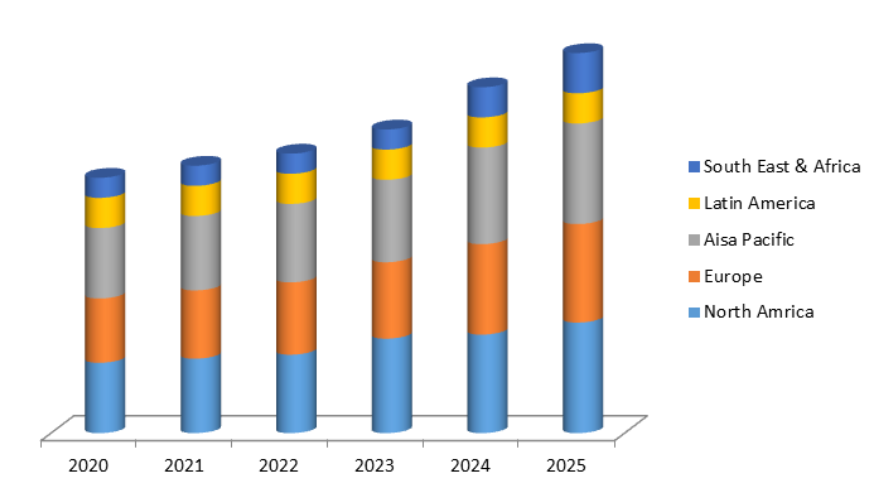“Tomorrow belongs to those who can hear it coming.” ― David Bowie
The future belongs to technological automation and those who have grasped this fact are bound to succeed. The retail industry has been a happening one and customer engagement is one huge priority in this business. Technology has been completely changing the way organizations are handling business and engaging clients. Retail automation is radically transforming the way humans interact with businesses, giving a bright futuristic outlook to the retail industry. Newer and interesting ways are being sought after, for garnering the best of customer loyalty, business revenue and productivity.
The Global Retail Automation Market is expected to be around US$ 21.50 Billion by 2025 at a CAGR of 11% in the given forecast period (Read). Automation is like the magic wand that is turning everything into gold. Like others, the retail industry has stuck to this magic wand and is showing wonders. Retail automation is getting in newer trends and possibilities for a bright business future. Everyone is benefiting – the end users, customers, employees, management, alike.

Source: Global Retail Automation Market Size, Share Analysis by Region
Before we plunge into understanding retail automation in detail and why is it vital for business, let us firstly look through the major challenges that the retail industry is facing and the global driving factors. This will help us ascertain the need for retail automation.
Key Challenges Faced by Retail Industry
- Customers are expecting a multi-channel, competitive buying experience
- Customers are looking for a seamless, fast, and effective shopping experience
- Retailers need to carve a unique way of working to attract more clients
- Excess of marketing strategies can complicate processes and harm outcome
- There is excessive data that can help grow business but barely any resources or expertise
Major Driving Factors of Retail Automation Globally
- Need for cost reduction
- Customer demand to enhance quality, speed, and delivery processes
- Peer competition from different global and local retailers
- Reduction in human errors, human involvement in each process and duplicity of work
- Better management of inventory processes and supply chain management
What is Retail Automation?
Retail automation refers to automating certain processes or parameters in the retail industry, to perform actions as needed, without major human intervention. Ranging from order management to inventory management to payment process to POS and including more, these retail processes can be automated to delivery best of results. Retail automation is not mere automation of activities, its boundaries grow as your business grows. It even takes care of specific needs like catering to sudden demand, anticipating risks and managing them, handling sales/commissions/discounts etc.
The major concern of retailers was to address the key obstacles of agility, accuracy, and efficacy. Automation is the answer to all these hurdles. Retailers have now realized the potential of digital transformation and that it is key to achieving a faster go-to-market time, enhanced profitability and maximized revenue.
Retail automation is the fundamental concept of leveraging computers and technology to facilitate processes, workflows to independently function with least human intervention. Technologies like AI or ML are key ingredients in automating retail procedures. It handles automation of manual retail procedures, commerce activities, payment process, marketing activities and more. It also handles the procurement, data consolidation, reporting processes etc. Certain key areas in the retail segment, that can be automated are in-store and warehouse processes, Point of Sale – kiosks, self-checkout systems, hardware equipment like barcode, RFID, camera, electronic shelf labels etc. and superstores, hypermarkets, retail pharmacy stores, fuel stations etc.
Especially, in today’s scenario, when the pandemic has the hit the world hard, retailers are finding it necessary to adapt to newer technologies like data analytics, smart technology, workload automation etc. Retail automation is helping retail industries to transform into a technology-driven business.
Some of the ground-breaking retail IT solutions that are contributing bigtime to a growing business are:
- Beacons and iBeacons based solutions for proximity marketing and location-based services
- Retail mobile apps for mobile-driven shopping and business
- BI & Big Data solutions for improved retail and shelf analytics
- CRM solutions for enhanced customer loyalty and better retention
- Custom ERP (Enterprise Resource Planning) solution for augmented profitability and profitability
- Sales Force Automation solution for better management of field force
- Vehicle tracking system for systematic monitoring of vehicles and drivers
A Good Read: On Demand Grocery Delivery Apps – A Retailer’s Guide For Online Grocery Services
Why is Retail Automation Vital for Business Success?
- Helps In Managing and Cutting Costs
Since retail automation takes care of multiple tasks at a time, reducing human intervention, it helps organizations in taking care of cost cutting and managing expenses within stipulated limit. Labor costs are reduced and so is the intervention of human resources at each step. This leads to saving on hiring more resources for petty jobs.
Retail automation has been dealing with repetitive jobs and hence helps in enhancing client satisfaction, lessening extra expenses, creating more job opportunities, maintaining relations with suppliers, shortening the time between delivery and sale, and needing lesser staff members to complete tasks.
- Makes Supply Chain Management More Effective
Automation of the retail industry has increased the efficiency level of the entire supply chain management process and its related activities. It helps in powering inventory procedures and thereby has a direct impact on the supply chain and its efficiency levels. This assists and offers more of capital investment for further business progress.
Retail automation reduces downtime, manages a smooth workflow, maintains operations all the while, fastens process executions and thereby, ensures business effectiveness and accurate results. It also ensures a smooth third-party integration with other related tools and technologies.
A Good Read : Create A Progressive Supply Chain With Business Intelligence and Predictive Analytics
- Offers Client an Exceptional Experience
Offering a superior working experience will have a direct impact on the experience that the client feels. A good client experience is what will be the direct outcome of implementing automation in the retail units. Before sales, after sales and even while shopping is on, the clients get an overall good performance, thanks to automation of processes through software services.
And, if the customers enjoy a great experience, there is a direct increase in further sales, better business, and productive output. Automation leads to increased scalability, personalized experience, faster order catering, seamless frontend, and backend experience, maintaining necessary inventory levels, personalized communications, and faster order pickup and delivery.
- Increases Sales and Business Output
Since processes are automated, customers are more satisfied and ready to offer more business, it is natural that the sales figures will rise by a huge margin. Newer customers will get created to offer more business and the older ones continue to give more orders. Personalized promotions play a key role in attracting customers to place more orders.
With the help of virtual opportunities like online marketplaces, sales can be increased through virtual medium. Traditional retail is also experiencing a boom, thanks to automation of many physical processes that pertain to stores and physical entities.
- Fraud Detection and Enhanced Security
Automating helps in finding out frauds through alerts and notifications and thereby, increase the security control over the entire retail application. High risk items can be taken care of, in a special manner and labels could be put on them for better understanding. Modern-day technologies like AI and ML are strong enough to extract the best out of the business.
Sensitive business information can be shared as per access given, based on the automation procedures. Encryption tools can help in data management to lessen the risk of fraud and extract the best possible data.
- Reduces Human Error and Increases Accuracy
Since there are machines and automated processes involved, there are lesser chances of human errors occurring. This strengthens the system with a better efficiency level. Automation brings along an extra layer of accuracy for availing correct information, at the right time, right place and in the right format.
Processes like analytics and reporting, inventory management, accounting and finance, order management etc. help in garnering more accurate data and lesser errors done by taskforce. Automation helps in minimizing human mistakes and maintenance of manual records.
- Frees Time and Allows More Creative Work
When all tasks were done manually, the entire taskforce was busy in managing that, leaving aside their own creative innovativeness. Automating tasks offers more of creative time to the taskforce to think innovatively in their own periphery and come up with newer ideas and implement them with ease.
Customers also interact with automated processes, thereby leaving employees free from the continuous hovering of clients. Automation makes everyone happy – customers and working taskforce alike.
- Offers Personalization and Flexibility
Since the center of focus remains the customer, it is obvious that the clients will get a personalized experience. This makes the customer happy, contended, and keen to offer more business, especially when the processes understand what they need.
Automation also offers a great deal of flexibility in implementing processes. It is easy to alter retail processes to a certain extent to incorporate client related changes. Automation gives more control to the customers making them happy and thereby, keeping the reins yet with the retailers.
- Provides Greater Scalability
Retail automation helps business enhance scalability to newer heights. It helps expand sales categories, functionalities related to retail industry to accommodate a larger range of customers, locations, orders, warehouses, shopping locations etc. It also fastens the business workflow, getting better results in lesser time.
Data consolidation is faster and give better analytical results, in terms of a variety of reports and dashboards, that the managers and stakeholders can use for bettering business and growing revenue.
Automating Retail Industry – It is Time for a Revolution!
Like most other industry segments, the retail industry is a booming one. For the business to prosper and move ahead rapidly, the only key is automation. As per proven statistics, over 2.14 billion people worldwide are expected to buy goods and services online in 2021 — up from 1.66 billion in 2016.
Retail automation and retail IT solutions and services has been an indispensable ingredient in the success story of most retail businesses and there are newer advancements coming up to prove its worth. Above reasons are self-explanatory to the fact that automation in inevitable. Let the retail world enjoy the fruits of automation!



